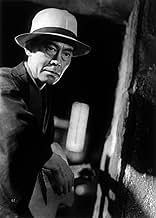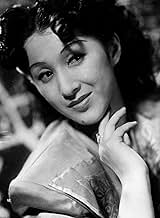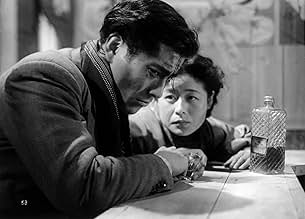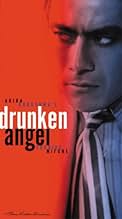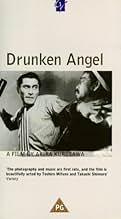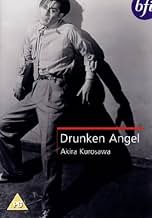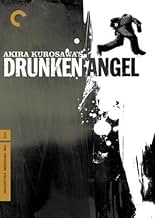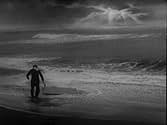ÉVALUATION IMDb
7,6/10
14 k
MA NOTE
Un médecin ivrogne au tempérament volatil et un voyou tuberculeux enclin à la violence forment un lien fugace.Un médecin ivrogne au tempérament volatil et un voyou tuberculeux enclin à la violence forment un lien fugace.Un médecin ivrogne au tempérament volatil et un voyou tuberculeux enclin à la violence forment un lien fugace.
- Director
- Writers
- Stars
- Prix
- 4 victoires au total
Mayuri Mokushô
- Daughter at Flower Shop
- (as Kumiko Mokushô)
Avis en vedette
A very, very vivid film from Japanese legend, Akira Kurosawa. The Japanese town that is the setting for "Drunken Angel" is vividly captured by Kurosawa, and the filthy swamp that separates the doctor from the filthiness of the town is brilliant. Toshiro Mifune plays a tuberculosis stricken gangster who is slowly won over, despite his vicious pride, by the caring but sarcastic doctor. The swamp is a reflection of the corruption in the town and in one of the first scenes a group of children are seen playing in it. Kurosawa's way of foreshadowing these children's future since the town is controlled by the immoral gangsters. With the arrival of Okadu, a released convict and gangster, and struggles with his health, Mifune struggles through conflicts of soul which are brilliantly metaphored by Kurosawa. A great drama with some brilliant commentary about post-WW2 Japan. Solid characters carry with film about typical with the Doctor being an unforgettable creation and Toshiro Mifune giving a powerful performance.
10Alan-57
Drunken Angel is another classic from arguably the greatest filmmaker of all-time. The story revolves around a petty gangster (Toshiro Mifune), who contracts TB and the Doctor (Takashi Shimura) who attempts to treat him despite the gangster's foolish pride. Mifune and Shimura, Kurosawa regulars, are brilliant in their respective roles. Kurosawa takes on film noir as well as any auteurs of his time. This is a must see for Kurosawa fans.
I loved this movie for many reasons:
The film history : it's the first collaboration between Akira Kurosawa (director) and Toshiro Mifune (actor) that continued through 15 more films including the sublime Rashomon, Seven Samurai and Yojimbo.
The style : it's a great film noir with gangsters, zoot suits, speakeasy's, gambling etc.,
The history : post WW II Japan is a frightening place with rubble, raw sewage, crime and hope. It's a world I hadn't seen before.
Toshiro Mifune : What an amazing actor. He oozes charisma and you cannot take your eyes off of him. His performance reminded me of the first time I saw Russell Crowe, in a little seen mediocre movie called "For the Moment" which I watched many times because of Crowe's intensity.
My only problem is the copy I saw was terrible. The print was faded and half of the subtitles were illegible. When will this be released on DVD? It's not Kurosawa's best film, but it's certainly better than most of the drivel out there.
The film history : it's the first collaboration between Akira Kurosawa (director) and Toshiro Mifune (actor) that continued through 15 more films including the sublime Rashomon, Seven Samurai and Yojimbo.
The style : it's a great film noir with gangsters, zoot suits, speakeasy's, gambling etc.,
The history : post WW II Japan is a frightening place with rubble, raw sewage, crime and hope. It's a world I hadn't seen before.
Toshiro Mifune : What an amazing actor. He oozes charisma and you cannot take your eyes off of him. His performance reminded me of the first time I saw Russell Crowe, in a little seen mediocre movie called "For the Moment" which I watched many times because of Crowe's intensity.
My only problem is the copy I saw was terrible. The print was faded and half of the subtitles were illegible. When will this be released on DVD? It's not Kurosawa's best film, but it's certainly better than most of the drivel out there.
This is a strange film about a very committed but screwed up doctor in post-war Japan. The doctor lives in the slums of Tokyo and is amazed at the filth and widespread incidence of preventable diseases among the poor. While this is an important cause to him, so is getting drunk and screwing up his life. However, the doctor meets a young hoodlum, played by Toshiro Mifune, and he treats him even when the guy insists everything is just fine! And, at times afterwards, Mifune alternates from being thankful and decent to being belligerent and completely antisocial. Throughout the film, the doctor works hard to keep this unlikable character alive--despite it seeming pretty obvious that Mifune has a death wish. A fascinating and odd story about the relationship between two very oddly matched men.
Considering this is the first collaboration between one of the 'heavyweight' director/star combos in cinema (tops in the Japanese film world, probably their equal to America's Scorsese/De Niro), this is quite a powerhouse of drama. That's not to say it's a completely dour film- some of Akira Kurosawa's trademark ironic (and subtle) humor is laced into scenes. But more-over, Kurosawa made here an important film for its time. While the team of Kurosawa and Toshiro Mifune would become even more internationally known for the thrilling Japanese mystery Stray Dog, and the masterpiece Rashomon, this film seems to get a little under-looked by Kurosawa fans (at least those that haven't quite dug into the catalog of their work). Is it their very best? Not quite, but it ranks high up there for me.
And it's not just the collaboration of the director and the star- there is also the co-star, Takashi Shimura, who has made his great mark on many of Kurosawa's films (the two I mentioned previous, plus his best role in Ikiru, and Seven Samurai as well). He plays a doctor who can't quite lay off the booze, even as he tries to help the people around him who seem to be contracting all sorts of bad diseases from the contaminated water (most notably tuberculosis). Mifune plays a member of the Yakuza crime gang, but is more of just a low level thug than a real 'somebody'. He's getting signs of TB, and goes to the 'good' doctor, who refuses help to the Yakuza, having outright contempt for them. Through the course of the film, The two actors portray these people as fragile, intense, hostile, compassionate, and with all the great emotional impact that comes in Japanese dramas.
While one might want to check this out for the context of the Yakuza part of the plot (which was one reason I wanted to check it out- not the Yakuza in today's Japanese cinema of course), the side that Kurosawa shows wonderfully in a film like Red Beard is also brought to light here. There's some action, but it gets thrown into a larger, more emotional context as Mifune's character starts to deteriorate. It becomes very theatrical in a sense, but there is also the realism that Kurosawa had on his sleeve, one that he had to express in post-war Japan (many of these post-war images are better expressed in Stray Dog, but he gives some ample time here too in a subtler, more dangerous context). So this mix comes together, and it turns into one hell of a picture. It may feel a little on the weak side compared to some of Kurosawa's magnum opuses (Seven Samurai, Ran, Yojimbo come to mind). Yet it ranks as an important point in the careers of the actors and director, and it contains enough great moments, enough in terms of the position of the camera and the often shattering music, to make it an under-rated (perhaps minor) classic. Personally, I loved it- especially the last twenty minutes.
And it's not just the collaboration of the director and the star- there is also the co-star, Takashi Shimura, who has made his great mark on many of Kurosawa's films (the two I mentioned previous, plus his best role in Ikiru, and Seven Samurai as well). He plays a doctor who can't quite lay off the booze, even as he tries to help the people around him who seem to be contracting all sorts of bad diseases from the contaminated water (most notably tuberculosis). Mifune plays a member of the Yakuza crime gang, but is more of just a low level thug than a real 'somebody'. He's getting signs of TB, and goes to the 'good' doctor, who refuses help to the Yakuza, having outright contempt for them. Through the course of the film, The two actors portray these people as fragile, intense, hostile, compassionate, and with all the great emotional impact that comes in Japanese dramas.
While one might want to check this out for the context of the Yakuza part of the plot (which was one reason I wanted to check it out- not the Yakuza in today's Japanese cinema of course), the side that Kurosawa shows wonderfully in a film like Red Beard is also brought to light here. There's some action, but it gets thrown into a larger, more emotional context as Mifune's character starts to deteriorate. It becomes very theatrical in a sense, but there is also the realism that Kurosawa had on his sleeve, one that he had to express in post-war Japan (many of these post-war images are better expressed in Stray Dog, but he gives some ample time here too in a subtler, more dangerous context). So this mix comes together, and it turns into one hell of a picture. It may feel a little on the weak side compared to some of Kurosawa's magnum opuses (Seven Samurai, Ran, Yojimbo come to mind). Yet it ranks as an important point in the careers of the actors and director, and it contains enough great moments, enough in terms of the position of the camera and the often shattering music, to make it an under-rated (perhaps minor) classic. Personally, I loved it- especially the last twenty minutes.
Le saviez-vous
- AnecdotesIn early drafts of the script, the story was almost entirely about Doctor Sanada (Takashi Shimura) and Matsunaga the thug (Toshirô Mifune) was a small supporting part. However, Akira Kurosawa was so impressed with Mifune's performance that he greatly increased the Matsunaga part, to the point where the Doctor and Matsunaga are almost equal in screen-time.
- GaffesEven though the story takes place during the hot summer, breath can be seen coming from characters in several scenes.
- Citations
Dr. Sanada: The Japanese love to sacrifice themselves for stupid things.
- ConnexionsFeatured in Kurosawa and the Censors (2007)
Meilleurs choix
Connectez-vous pour évaluer et surveiller les recommandations personnalisées
- How long is Drunken Angel?Propulsé par Alexa
Détails
Box-office
- Brut – États-Unis et Canada
- 46 808 $ US
- Fin de semaine d'ouverture – États-Unis et Canada
- 15 942 $ US
- 28 juill. 2002
- Brut – à l'échelle mondiale
- 47 023 $ US
- Durée1 heure 38 minutes
- Couleur
- Rapport de forme
- 1.37 : 1
Contribuer à cette page
Suggérer une modification ou ajouter du contenu manquant

Lacune principale
By what name was L'ange ivre (1948) officially released in India in English?
Répondre
